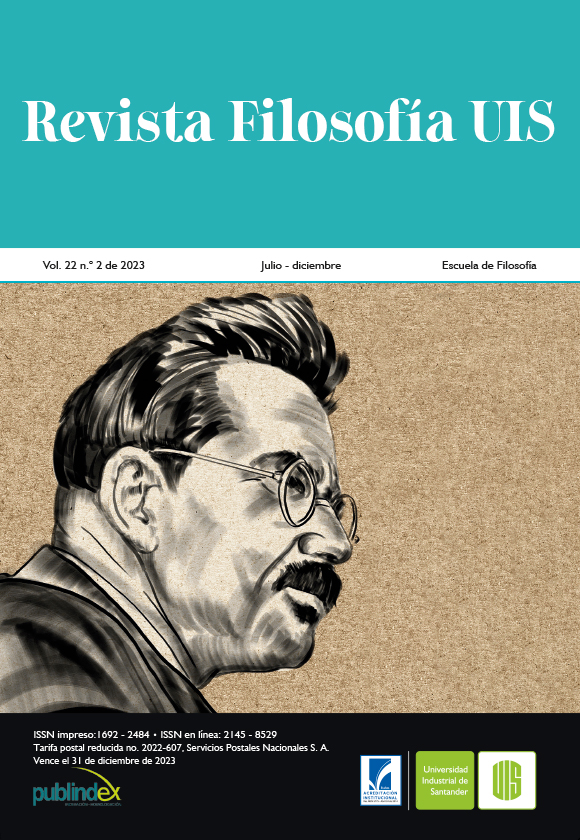Editorial
Editorial. Video Games: a Challenge for Philosophy
Published 2023-06-30
How to Cite
Maldonado Serrano, J. F., & Cáceres Rojas, P. (2023). Editorial. Video Games: a Challenge for Philosophy. Revista Filosofía UIS, 22(2), 11–22. https://doi.org/10.18273/revfil.v22n2-2023018
Copyright (c) 2023 Revista Filosofía UIS

This work is licensed under a Creative Commons Attribution 4.0 International License.
Abstract
The different philosophies of existence during the twentieth century, turned the lens of philosophy to focus the problems of everyday life. In part, it was a change of the philosophical interests of the great systems which, with certain methodologies in harmony with their object, focused on a universal, abstract and comprehensive result: historicity, the absolute or the spirit, consciousness, religion, capitalism, history, the basis of scientific or mathematical knowledge, to list the most recognized.
Downloads
Download data is not yet available.
References
- Albt, C. C. (1970). Serious Games. University Press of America.
- Bacca, J. D. (1990). Filosofía de la música. Anthropos.
- Badiou, A. (1999). El ser y el acontecimiento (R. Cerdeiras, trad.). Manantial.
- Benjamin, W. (2003). La obra de arte en la época de su reproductibilidad técnica (A. E. Weikert, trad.; 1.a ed.). Itaca.
- Berry, D. M. (2011). The Philosophy of Software: Code and Mediation in the Digital Age. Palgrave Macmillan.
- Bogost, I. (2016). Play Anything: The Pleasure of Limits, the Uses of Boredom, and the Secret of Games. Basic Books.
- Bourdieu, P. (1999). Meditaciones pascalianas (T. Kauf, trad.; 1a ed.). Anagrama.
- Churchland, P. M. (2010). Materia y conciencia: Introducción contemporánea a la filosofía de la mente (M. Mizraji, trad.). Gedisa.
- Colburn, T. R. (1999). Software, Abstraction and Ontology. The Monist, 82(1), 3-19.
- Deleuze, G. (2004). Imagen Movimiento – Estudios sobre cine 1 (I. Agoff, trad.). Paidós.
- Deleuze, G. (2005). La imagen-tiempo: estudios sobre cine 2 (Irene Agoff, trad.). Paidós.
- Flores Ledesma, A. (2022). Marx juega: Una introducción al marxismo desde los videojuegos (y viceversa). Episkaia.
- Flores Ledesma, A. F. y Velasco Padial, P. V. (2020). Ideological Games: Videojuegos e ideología. Héroes de Papel. https://dialnet.unirioja.es/servlet/libro?codigo=783231
- Floridi, L. (1999). Philosophy and Computing: An introduction. Routledge.
- Floridi, L. (2011). The philosophy of information. Oxford University Press.
- Foucault, M. (1998a). Historia de la sexualidad 1: La voluntad de saber (U. Giñazú, trad.; Vol. 1). Siglo XXI Editores.
- Foucault, M. (1998b). Historia de la sexualidad 2: El uso de los placeres (M. Soler, trad.; Vol. 2). Siglo XXI Editores.
- Foucault, M. (1998c). Historia de la sexualidad 3: La inquietud de sí (T. Segovia, trad.; Vol. 3). Siglo XXI Editores.
- Foucault, M. (2002). La arqueología del saber (A. Garzón del Camino, trad.). Siglo XXI Editores.
- Foucault, M. (2009). Vigilar y castigar: Nacimiento de la prisión (A. Garzón del Camino, trad.). Siglo XXI Editores.
- Frasca, G. (2001). Videogames of the oppressed :videogames as a means for critical thinking and debate [Tesis de maestría]. Georgia Institute of Technology.
- Frasca, G. (2003). Ludologists love stories, too: Notes from a debate that never took place. Digra, 2, 92–99.
- Gadamer, H.-G. (1996). Verdad y Método Vol I (A. Agud y R. Agapito, trad.). Ediciones Sígueme.
- Grimes, S. M. (2021). Digital Playgrounds: The Hidden Politics of Children’s Online Play Spaces, Virtual Worlds, and Connected Games. University of Toronto Press.
- Grimes, S. M. & Feenberg, A. (2009). Rationalizing Play: A Critical Theory of Digital Gaming. The Information Society, 25(2), 105-118. https://doi.org/10.1080/01972240802701643
- Heidegger, M. (2010). Caminos de bosque (H. Cortés y A. Leyte, trad.). Alianza Editorial.
- Hui, Y. (2016). On the Existence of Digital Objects (1a ed., Vol. 48). University of Minnesota Press.
- Huizinga, J. (2012). Homo ludens (E. Ímaz, trad.). Alianza Editorial.
- Jagoda, P. (2020). Experimental Games: Critique, Play, and Design in the Age of Gamification. University of Chicago Press.
- Juul, J. (2011). Half-Real: Video Games between Real Rules and Fictional Worlds. MIT Press.
- Koepsell, D. R. (2003). The Ontology of Cyberspace: Philosophy, Law, and the Future of Intellectual Property. Open Court Publishing.
- Lipovetsky, G. (2002). La tercera mujer: Permanencia y revolución de lo femenino (R. Alapón, trad.; 5a ed.). Anagrama.
- Maldonado Serrano, J. F., Rodríguez Ramírez, D. A., Caceres, P. B., y Petit Suárez, J. F. (2020). An Ontology of Software: Series, Structure and Function. Praxis Filosófica, (51), 115-132. https://doi.org/10.25100/pfilosofica.v0i51.10114
- Mumford, L. (1992). Técnica y civilización (C. Aznar de Acevedo, trad.). Alianza Editorial.
- Murray, J. H. (2017). Hamlet on the Holodeck, updated edition: The Future of Narrative in Cyberspace. MIT Press.
- Preston, B. (2013). A Philosophy of Material Culture: Action, Function, and Mind. Routledge. https://doi.org/10.4324/9780203069844
- Prigogine, I. & Stengers, I. (1990). La nueva alianza (M. García Valverde, trad.). Alianza Editorial.
- Rabardel, P. (2011). Los hombres y las tecnologías: Visión cognitiva de los instrumentos contemporáneos (M. Acosta Gempeler, trad.). Ediciones UIS.
- Reichenbach, H. (2012). Philosophic Foundations of Quantum Mechanics. Courier Corporation.
- Rorty, R. (1992). The Linguistic turn: Essays in philosophical method. University Of Chicago Press.
- Searle, J. R. (1980). Actos de habla: Ensayo de filosofía del lenguaje (L. Valdez, trad.). Ediciones Cátedra.
- Searle, J. R. (1992). Intencionalidad: Un ensayo en la filosofía de la mente (E. Ujaldón, trad.). Tecnos.
- Searle, J. R. (1997). La construcción de la realidad social (A. Domènech, trad.). Paidós.
- Searle, J. R. (2000a). El misterio de la conciencia (A. Domènech, trad.). Paidós.
- Searle, J. R. (2000b). Razones para actuar. Premio Internacional de Ensayo Jovellanos 2000 (J. Codisis, trad.). Ediciones Nobel, Sa.
- Searle, J. R. (2014). Creando el mundo social: La estructura de la civilización humana (J. Bostelmann, trad.). Paidós.
- Searle, J. R. (2018). Ver las cosas tal como son (V. Santamaría, trad.). Ediciones Cátedra.
- Simondon, G. (2007). El modo de existencia de los objetos técnicos (M. Martínez y P. Rodríguez, trad.). Prometeo Libros.
- Stiegler, B. (2002). La técnica y el tiempo 1: El pecado de Epimeteo (B. Morales Basto, trad.). Argitaletxe Hiru.
- Zizek, S. (2006). The Parallax View. MIT Press.

